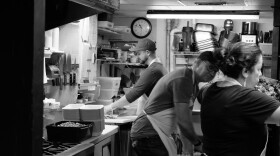Most New Englanders have likely heard of the Salem Witch Trials – a particularly notorious episode in colonial Massachusetts that resulted in the executions of 20 people for suspected witchcraft in 1692 and 1693. Less widely known is that over three decades earlier, Portsmouth, N.H. had its own witch hunt chapter. From the archives this week, we dig into reporter Robbie Honig's June 1988 story.
There were witches in Portsmouth in the 1650s – that is, if you call a woman of power and stature a witch. That was the accusation levied against Jane Walford – landowner, healer, and one of the pillars of the young community – in June 1656. Jane and her husband Thomas had come to Portsmouth from Essex County, England in 1631. The Walfords had previously settled in Charlestown, Mass. – but were banished for “unorthodox behavior” (i.e., any behavior not sanctioned by the Puritans).
Once in Portsmouth, the Walfords soon became large landowners, and Jane reportedly worked on her skills as a healer. She even befriended the few Native Americans remaining in the area, and incorporated some of their healing ways into her own. Despite her stature in the community (or perhaps because of it), in June 1656 she was accused of witchcraft after townspeople accused her of causing delusions in her neighbors.

“There were all sorts of depositions taken about whether Jane was a witch,” said historian Bruce Ingmire. “People from all over this community showed up to say, ‘She is a witch. She made my heart beat and my husband was sick in bed and she came to visit him and he had delusions.’ There were many inter-fights in the community that come out in this witch trial.”
Driven mainly by religious hysteria, witch trials in Europe dated back to the 15th century. In New England, however, there were new forces at work. Chief among them, according to Ingmire, was the competition for land. In Portsmouth harbor, settlers had found great islands and pine forests reminiscent of the island nation they had left.
“Therein lies the second part of the story,” he said. “If a witch was accused in New England of witchcraft, she lost her land. Witchcraft was a capital punishment. And in the process of your conviction, you lost your land. That was the first step. And now, people are beginning to find out that often the accusers were after that land.”
With no royal government, legal authority was held solely by Puritan town councils that had their own agenda to rid the world of evil. Ingmire said it was likely a combination of greed for land and the strict Puritan code for behavior that led to Walford’s ordeal. Walford was never condemned for witchcraft -- the 1656 case was dropped when the Puritan judges found it could not be proved that she was responsible for any damage to the community. After another accusation in 1669, Walford successfully sued her accuser for slander.
Walford was one of the first women to own land in the new world. Combined with her documented healing powers, this made her the object of envy and even fear. To some of her neighbors, that made her a witch. Today, Walford can be properly appreciated as one of the most unique women in early New Hampshire history.








